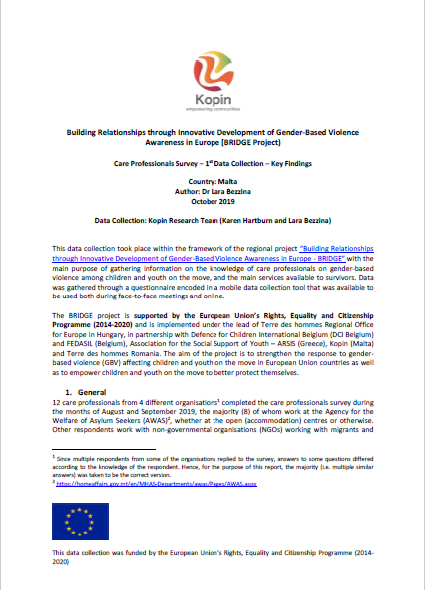- Log in to post comments
These two documents have been developed following the first round of data collection in Malta, implemented within the framework of the regional project “Building Relationships through Innovative Development of Gender-Based Violence Awareness in Europe - BRIDGE” with the main purpose of:
1) gathering information on the knowledge of care professionals on gender-based violence (GBV) among children and youth on the move, and the main services available to survivors. Data was gathered through a questionnaire encoded in a mobile data collection tool that was available to be used both during face-to-face meetings and online.
2) gathering information on the level of awareness among children and youth on the move on gender-based violence. Data was gathered through a questionnaire encoded in a mobile data collection tool that was used during face to face meetings.
The documents present the key findings of the conducted data collection activities as well as a set of recommendations.
Key findings from children and youth survey:
Based on the findings emerging from the survey, it is clear that while the young asylum seekers interviewed are aware of the possibility of speaking to the management of the centre they reside in should they encounter situations of violence / abuse, there is a huge lack of knowledge of the services and support regarding the same situations. While this does not mean these services do not exist, it indicates that the interviewees do not know of their existence or how to access them. This could be due to multiple reasons, including lack of information and language barriers (many residents do not speak English).
Key recommendations from children and youth survey:
● There is a need for regular and accessible information sessions on the services and support available at the centre and in Malta. While information might be given upon arrival at the centre, it is necessary that such information is given on a regular basis, especially considering that at the time of arrival residents are possibly overloaded with information. Information also needs to be delivered in an accessible manner in order for everyone to benefit. Thus, there is a need for interpreters and cultural mediators to help transmit the relevant information.
● Information needs also to be regularly disseminated by organisations (including non-governmental organisations [NGOs]) who are separate from the open centre but offer services to asylum seekers. While these NGOs are often short-staffed, they deliver vital services which need to be made better known to the residents.
● Language classes are of utmost importance. These are being delivered, both at the open centre and elsewhere; however there is a need for more since the ones delivered at the centre (by volunteers) are fully booked. If asylum seekers cannot communicate their needs to others, services and support will be redundant.
Key findings and recommendations from care professionals survey:
The data gathered shows that care professionals are rather confident in following the guiding principles of caring for young GBV survivors. However, it is evident that staff need more training on child protection and GBV, as indicated by their responses on training and their level of knowledge on these topics, where the majority do not feel their knowledge of GBV is adequate for their position.
There is also evidence that while these organisations do identify and refer young GBV survivors to the relevant entities and provide the necessary support, there is a need for more formal procedures for identification and referral, since these seem to currently be rather informal. There is also a need for more specific tools for GBV case management as well as training staff on these tools.
Although psychosocial support, health care, legal assistance, child protection and translation services are provided, very few residents know about them, indicating the need for information dissemination among migrants / asylum seekers about the types of support available and how to access them.
The BRIDGE project is implemented under the lead of Terre des hommes Regional Office for Europe in Hungary, in partnership with Defence for Children International Belgium (DCI Belgium) and FEDASIL (Belgium), Association for the Social Support of Youth – ARSIS (Greece), Kopin (Malta) and Terre des hommes Romania. The aim of the project is to strengthen the response to genderbased violence (GBV) affecting children and youth on the move in European Union countries as well as to empower children and youth on the move to better protect themselves.

The BRIDGE project is supported by the European Union’s Rights, Equality and Citizenship Programme (2014-2020)
The content of this publication represents the views of the author only and is his/her sole responsibility. The European Commission does not accept any responsibility for use that may be made of the information it contains.
